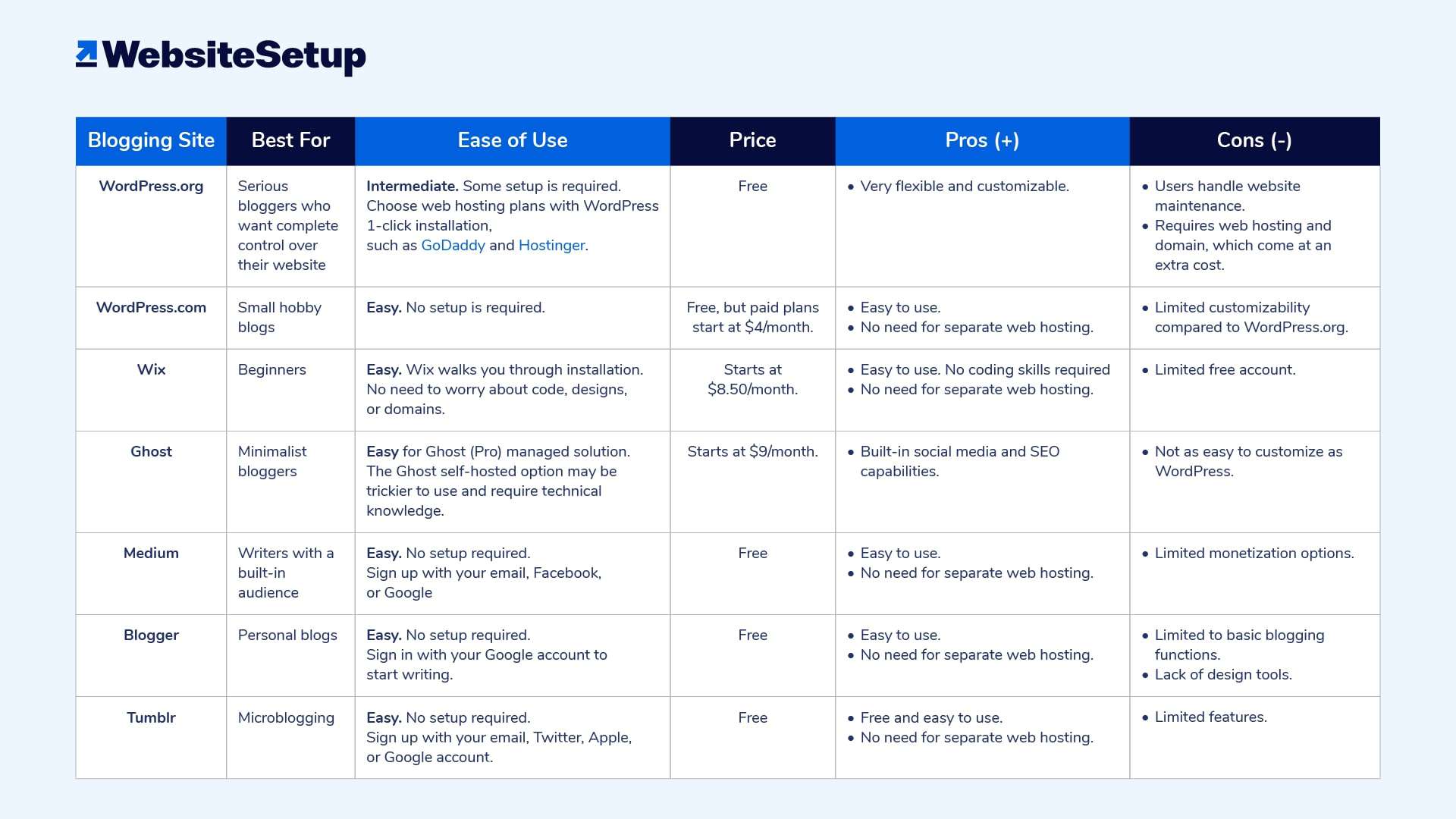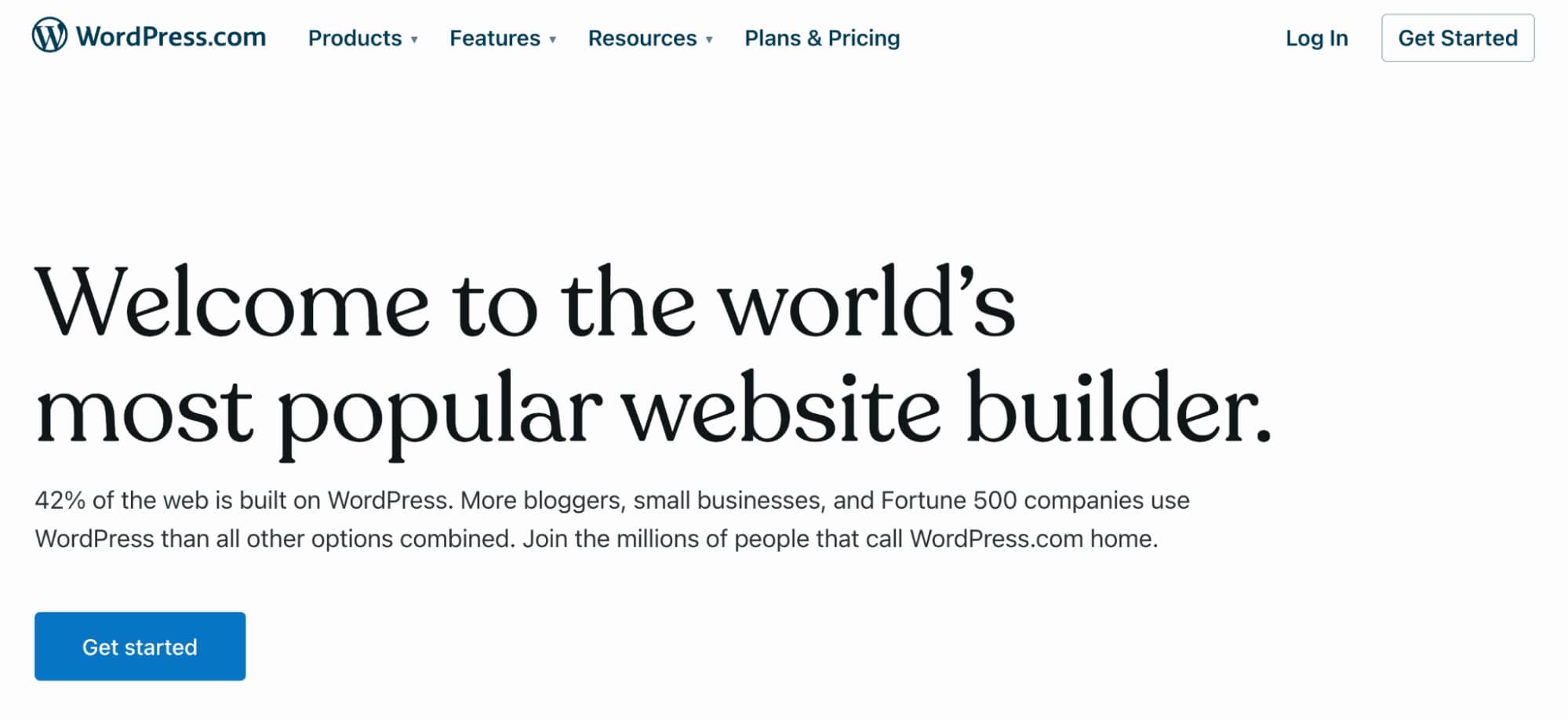Are you starting a new blog and wondering what the best blogging platform is?
With so many unique options available, choosing can be tricky.
For this article, we tested several of the best blogging sites to help you find the platform that suits your needs.
How To Choose the Best Blogging Platform
Before starting your blog, you must know what you want in a platform.
Here are some criteria to help you choose the best blogging site:
- Ease of use: Beginners need a user-friendly platform that’s easy to set up and manage and doesn’t require coding skills.
- Support: The best blogging sites offer customer support when you need help handling problems you can’t troubleshoot — whether they’re related to technical, sales, billing, payments, or experiences.
- Support should be available on multiple channels. Common mediums include live chat, email support, phone support, ticketing systems, forums, and knowledge bases.
- Flexibility: The best blogging platforms give you room to grow (scalability) and let you customize the website’s layout or functionality.
- Data/content ownership: Do you publish controversial pieces? Some blogging platforms consider themselves third-party platforms, meaning they control your content. They can remove your content if you violate their terms of service, and you can quickly lose your content when the platform shuts down.
- Monetization options: Most people don’t start blogging to monetize their website, while some start blogs for that purpose. It’s good to know you have the option to add an online store, subscriptions, or ads to your blog.
- Cost: The best blogging platforms should fit your budget and have features that are worth the price. A free platform isn’t worth it if it doesn’t do what you need.
Best Blogging Sites
- WordPress.org
- WordPress.com
- Wix
- Ghost
- Medium
- Blogger
- Tumblr
1. WordPress.org
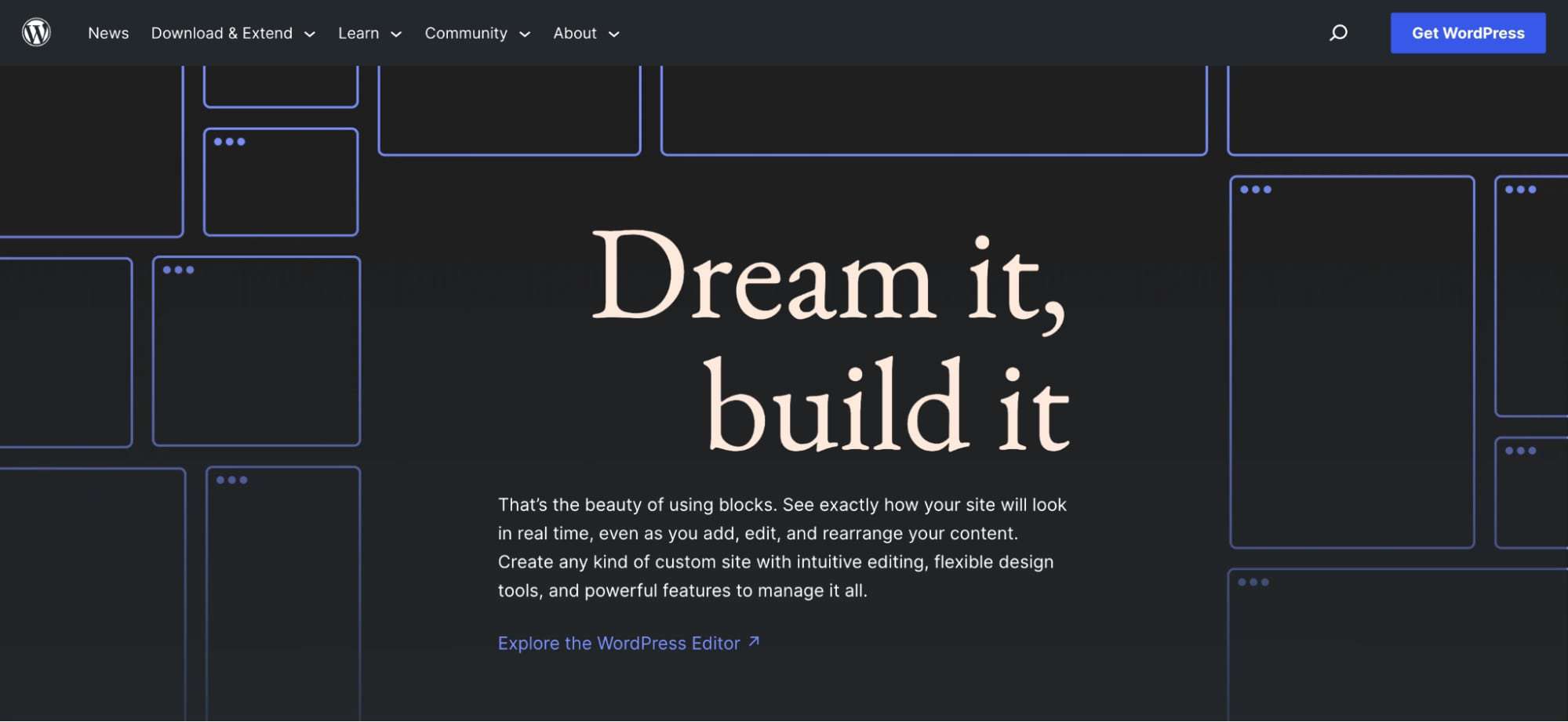
Founded in 2003, WordPress is the world’s most popular content management system (CMS). It powers 43% of the internet — from personal blogs and small business websites like WebsiteSetup to enterprise websites such as Sony, TechCrunch, and the Meta Newsroom.
Best blogging platform for: Serious bloggers who want complete control over their website.
Support: DIY. This free blogging platform doesn’t have an in-house support team but has a massive community of passionate users, so there’s someone bound to answer your question.
If you run into issues with your WordPress blog, you can:
- Check WordPress documentation.
- Ask a question on WordPress’ support forum.
- Read tutorials.
Some web hosting companies are knowledgeable about WordPress and can offer technical assistance. In fact, WordPress recommends Bluehost, DreamHost, and SiteGround.
Customization: Highly customizable, thanks to thousands of free and paid WordPress themes and plugins. WordPress plugins extend functionality and add extra features.
Data ownership: You own your content.
Monetization Options: Plenty. You can display ads, participate in affiliate marketing, sell digital products, and create membership websites.
Pricing: WordPress software is open source and free to download, but you’ll need to purchase a web host and domain name.
Check out our reviews on different web hosting plans.
2. WordPress.com
Don’t confuse WordPress.com with WordPress.org.
WordPress software powers both platforms, but their similarities end there.
WordPress.com is a fully hosted service, making it more beginner friendly but more limiting than WordPress.org — especially on the free plan.
The free plan:
- Limits domain names to [yourname].wordpress.com.
- Displays ads.
- Comes with limited built-in plugins.
Best blogging platform for: Small hobby blogs.
Support: None on the free and Personal plans. Live chat is available starting with the Premium plan.
Customization: Average. Users on the higher-tiered plans can use premium themes, install more plugins, and access advanced search engine optimization (SEO) tools.
Data ownership: WordPress.com owns your data.
Monetization Options: None on the free and Personal plans. Users to earn ad revenue on the Premium plan or higher.
Pricing: Limited free version available. Paid plans start at $4/month when billed annually.
3. Wix
With over 200 million users worldwide, Wix is a popular website builder primarily used to help small business owners create their websites easily.
Its blogging tool is popular with beginners because of its easy setup and built-in SEO tools.
Best blogging platform for: Beginners
Support: Ticketing, knowledge base, and phone support (for VIP clients) are available.
Customization: Wix allows you to customize your website using a drag-and-drop editor, an extensive collection of apps and integrations, and professional-looking templates.
Wix can also propose a design for your website using its Artificial Design Intelligence (ADI) software, Editor X. However, once you choose a template, you can’t change it.
Data ownership: According to Wix guidelines, you own your website data and content.
Monetization Options: Average. Wix offers a few monetization options, such as adding Google ads, creating blog post subscriptions, and adding a paywall.
Pricing: Limited free plan available. Paid plans start at $8.50/month when billed annually.
4. Ghost.org
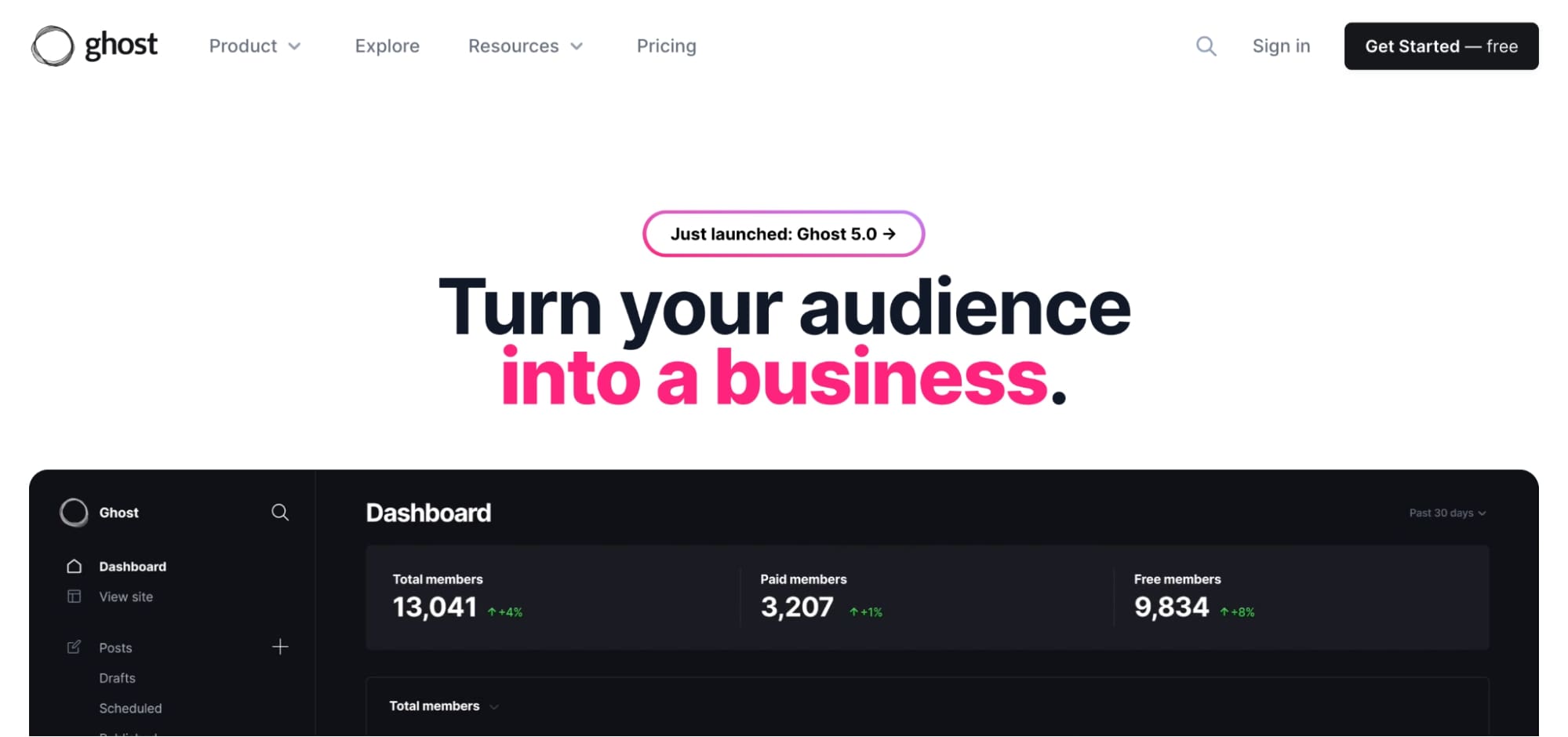
Founded in 2013, Ghost is an open-source blogging platform created as a more streamlined WordPress alternative. Ghost uses JavaScript (WordPress uses PHP and MySQL).
Like WordPress, it’s available as open-source software (Ghost) and a hosted platform (Ghost [Pro]). Ghost is for developers or users with more advanced technical know-how. Ghost (Pro) is for creators with monetizable audiences.
Best blogging platform for: Minimalist bloggers.
Support: Knowledge base and forums available. Ghost (Pro) also includes email support on basic plans and a dedicated account manager on higher-tiered plans.
Customizations: Plenty of customization features thanks to thousands of paid and free themes and integrations (Ghost’s version of plugins). Ghost also has built-in SEO and social sharing tools and supports third-party integrations.
Data ownership: Ghost gives you ownership and access to your content, members, and membership data.
Monetization Options: Multiple, like WordPress.org. With Ghost, you can:
- Start a membership website.
- Offer subscriptions.
- Become an affiliate.
- Display ads.
- Create an e-commerce store by adding the Snipcart integration.
Pricing: For the self-hosted option, you’ll need a web host and your own domain name.
We recommend hosting plans such as A2 Hosting and DigitalOcean. They may not have a free domain, but these powerful hosting providers can keep up with Ghost. DigitalOcean also offers one-click installation for Ghost.
The Ghost (Pro) fully managed hosted solution starts at $9/month when billed annually. Additional features include SSL and CDN, custom domain, and support.
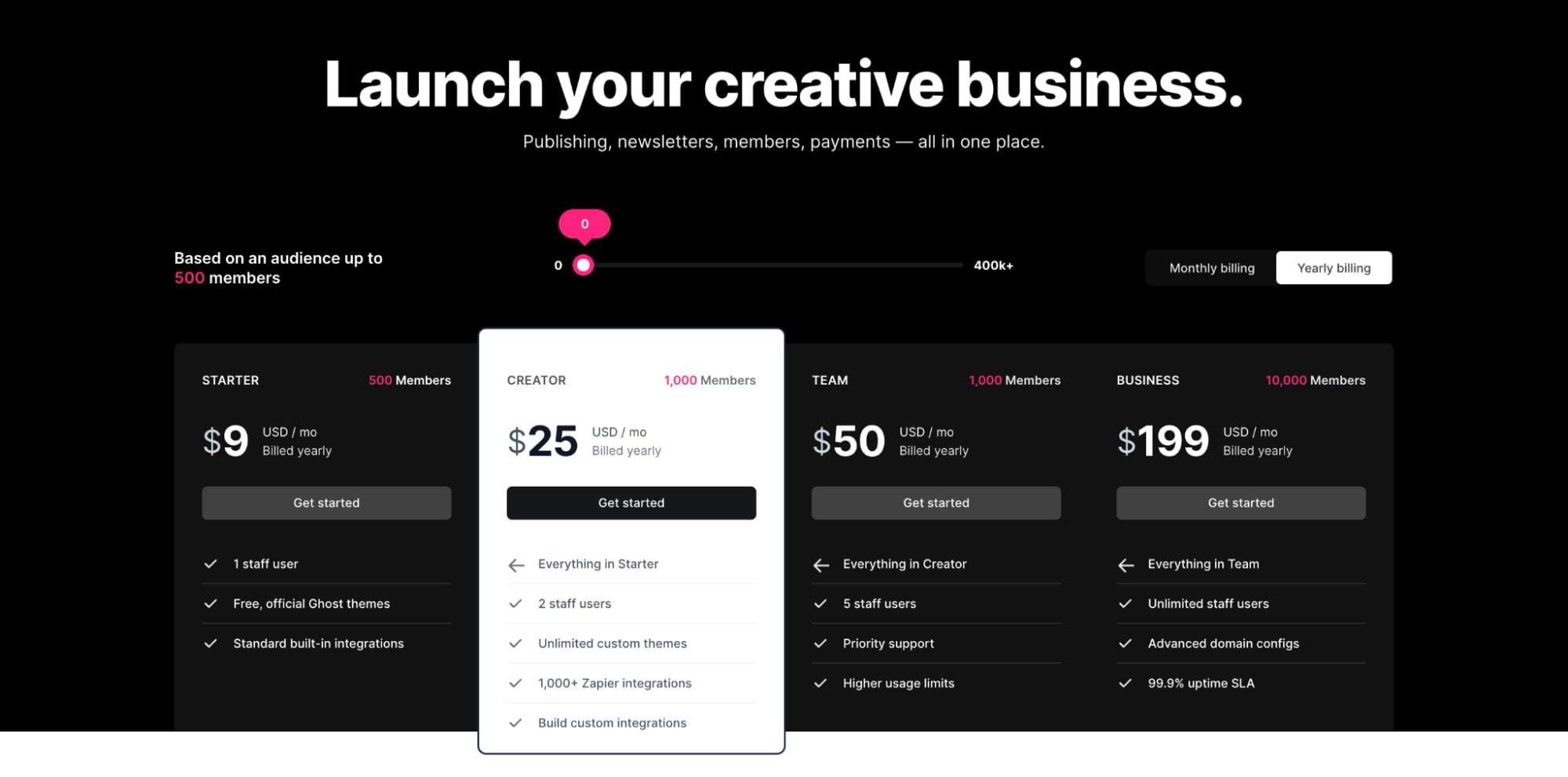
5. Medium
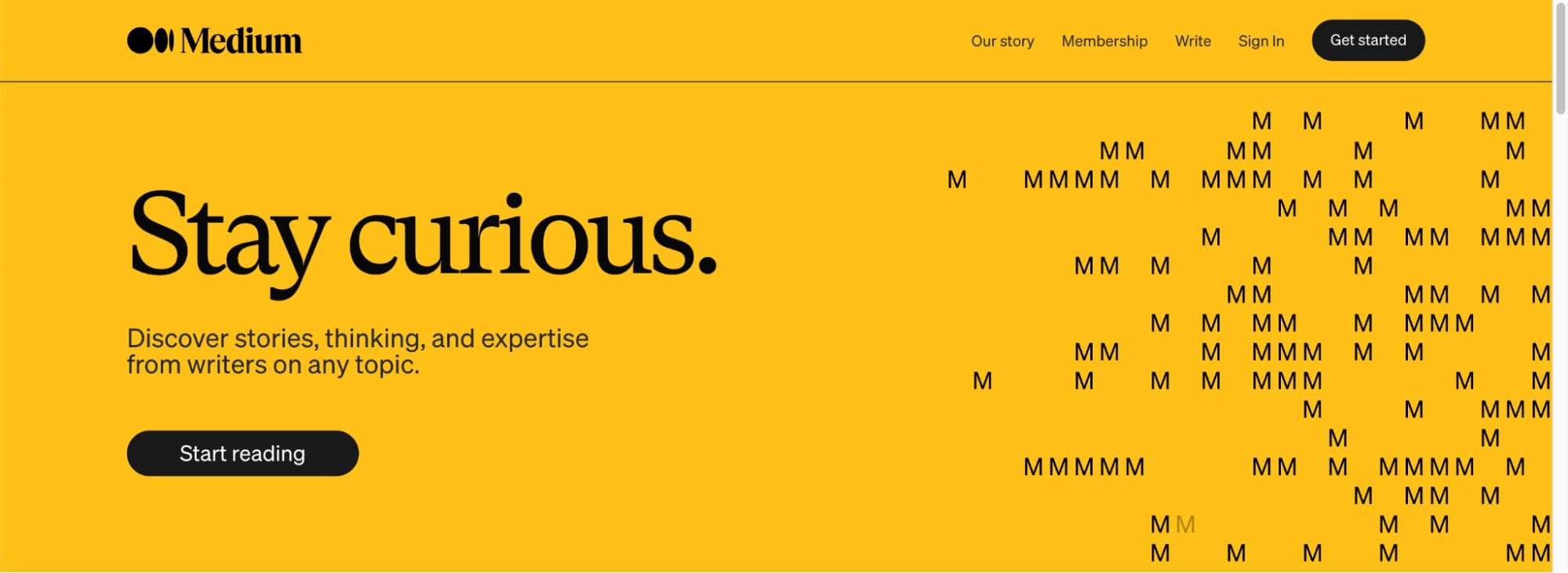
Twitter co-founder Evan Williams started Medium in 2012 so users could create posts longer than Twitter’s then-140 characters. It has a large pool of users — including former U.S. President Barack Obama.
People can sign up for free, choosing between two types of Medium accounts — writers and members (readers).
Writers can earn revenue through the Medium Partner Program. Readers can sign up for a paid membership to read additional articles outside their three free monthly article limit.
Best blogging platform for: Writers with a built-in audience.
Support: Ticketing and knowledge base available.
Customization: Medium allows you to embed content from other platforms, set domain names, and connect to email and social media accounts. However, it has limited customization options — almost all blogs look identical.
Data ownership: Medium controls your content. Also, it may be difficult to transfer your audience from Medium to another platform.
Monetization Options: Limited. The Medium Partner Program allows you to earn in two ways: the number of members referred and the time people spend reading your articles.
Pricing: Free plan available. Membership starts at $5/month.
6. Blogger
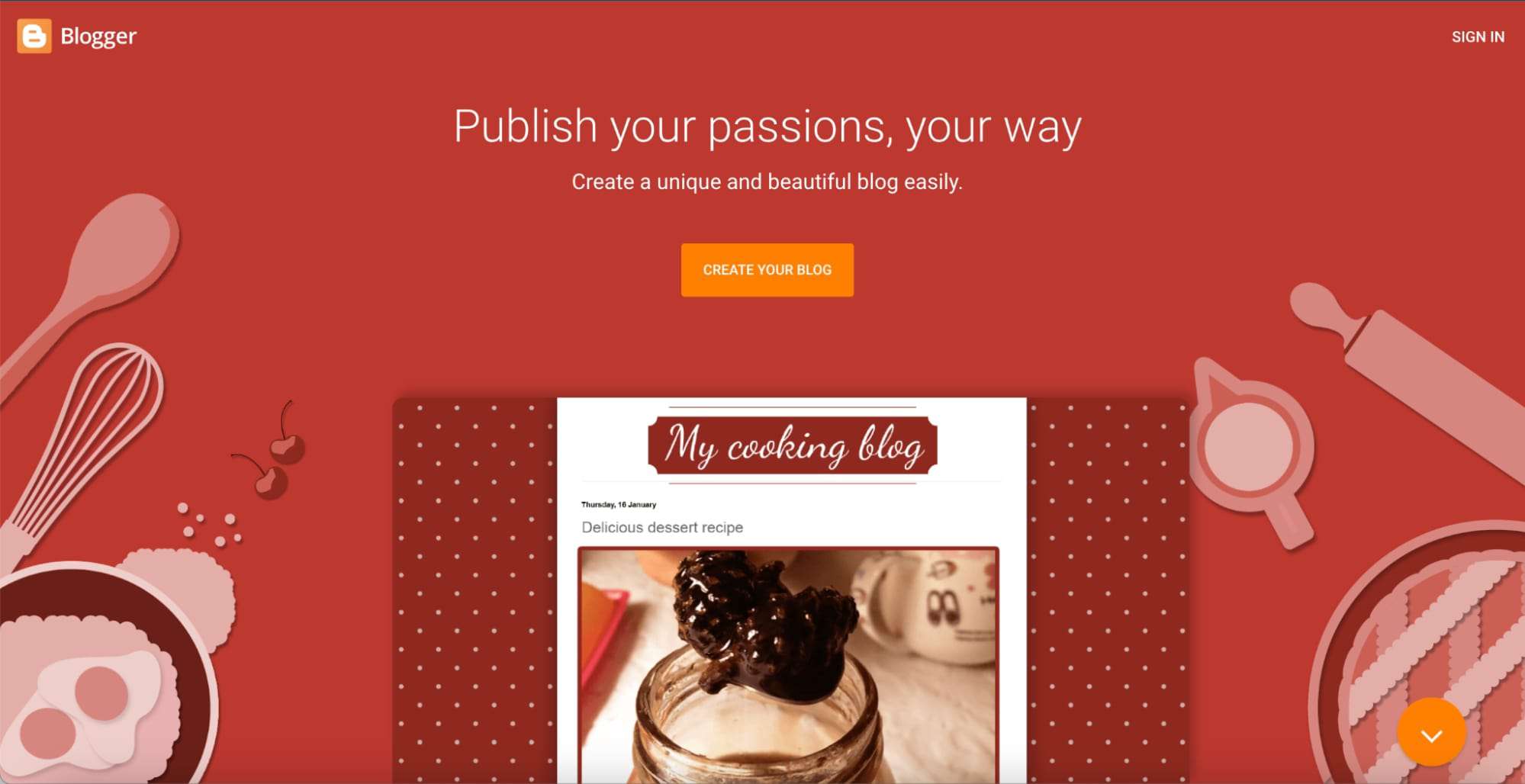
Founded in 1999 and acquired by Google in 2003, Blogger is one of the original blogging platforms.
Like Medium, it’s a great no-fuss solution if you want to start writing. Because Google owns it, you can easily sign up for free using your Google account. Blogger also integrates well with other Google offerings. For example, you can store images on Google Drive.
Free blog URLs appear as [yourname].blogspot.com, but you can also buy custom domains.
Best blogging platform for: Personal websites.
Support: The Blogger Help Center is the knowledge base. It also has a community forum.
Customization: Limited. Free predesigned themes are available, but you can purchase paid themes from marketplaces like ThemeForest and Etsy. Blogger also offers a password-protection feature to limit access to personal content.
Data ownership: You own your content, but Blogger controls it. Google runs the service and can shut it down whenever you violate its Terms of Service.
Monetization Options: Limited. You can display ads on your blog if you have an active Google AdSense account.
Pricing: Free. The only cost you might incur is if you want to buy a custom domain. Check out the best places to purchase a domain name.
7. Tumblr

In 2007, Tumblr started as a microblogging website highlighting multimedia content, such as audio, video, and GIFs.
Tumblr differs from other popular blogging platforms because of its social networking element. When you log in, you’ll see scrollable posts on the feed from accounts you follow — just like Instagram. You can re-blog (or share) these posts with a click and even add comments.
Since its inception, Tumblr has always had a predominantly young audience base. Nearly half of its 135 million active users are from Gen Z.
Best blogging platform for: Microblogging.
Support: Knowledge base and ticketing system available.
Customization: Limited customization options. Free and premium predesigned themes are available. You can also purchase themes from external marketplaces like Theme Atlantic and Creative Market. Tumblr also offers password protection to limit access to personal content.
Data ownership: On Tumblr, you own your content, but Tumblr controls it. It removes content that violates its Terms of Service.
You can save and migrate your files should you want to transfer to a different blogging platform, but it can be tricky because of Tumblr’s format.
Monetization Options: Limited. In 2021, Tumblr introduced Post+ for beta creators to monetize their content.
Pricing: Free. The only cost you might incur is if you want to buy a custom domain name.
7 Best Blogging Sites — What’s Your Pick?
When starting a blog, the question isn’t whether there are available platforms — it’s what platform to choose. Each has different features, pros, and cons.
Before picking the best blogging platform, determine your needs, goals, and preferences to make the decision easier.
Here at WebsiteSetup, we like the self-hosted WordPress because it’s powerful and flexible.
What do you consider the best blogging website? Let us know in the comments below.
